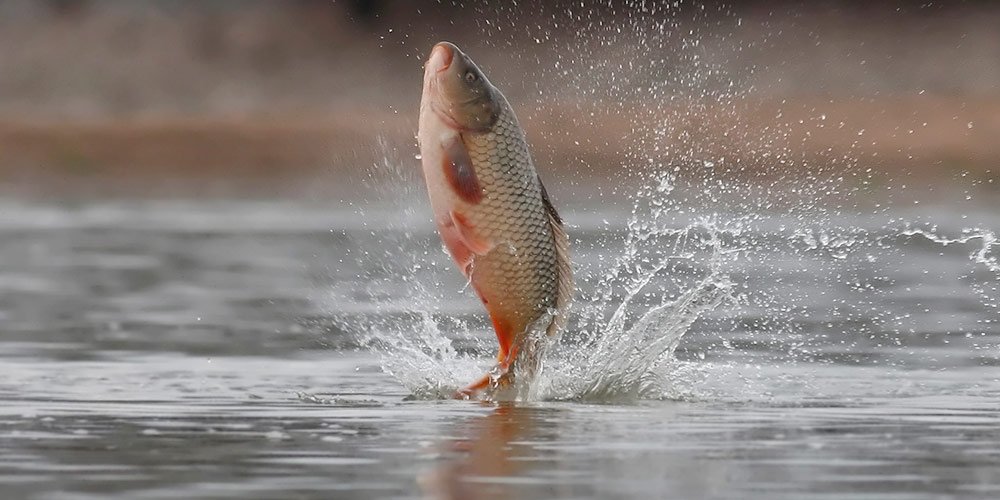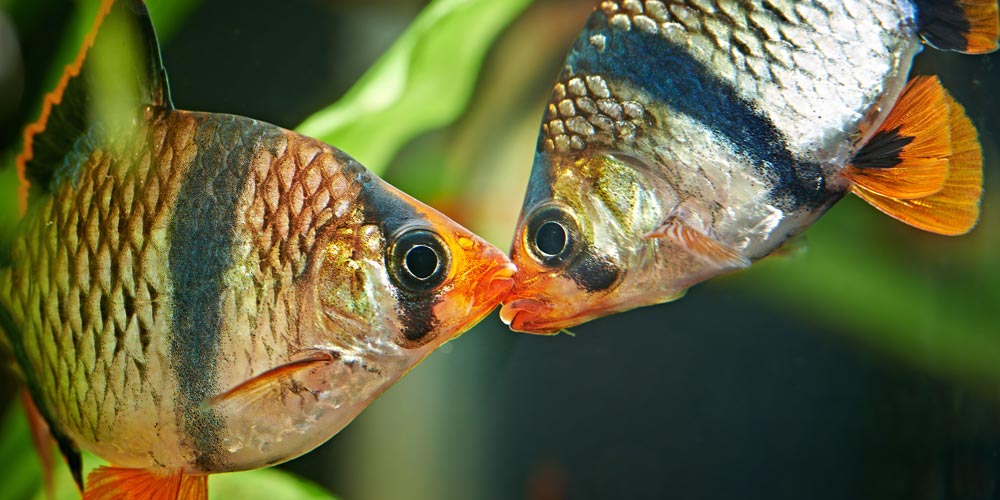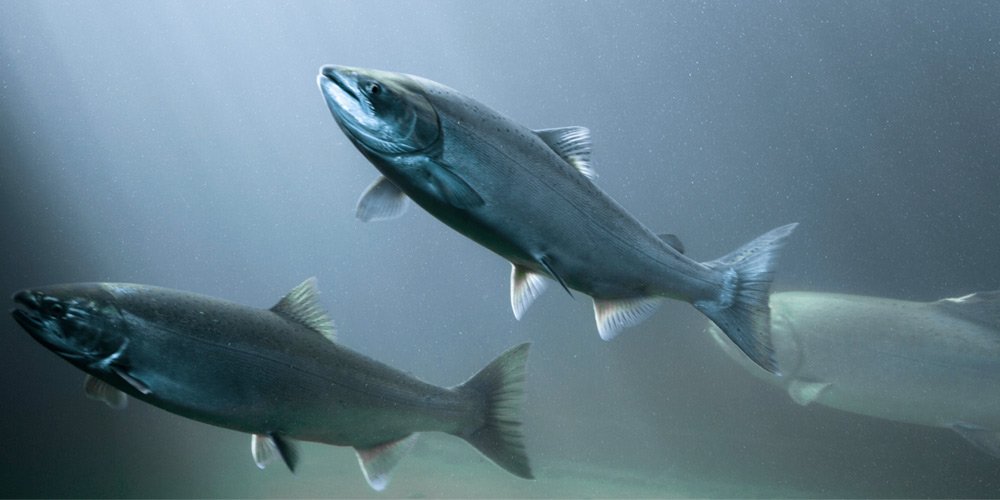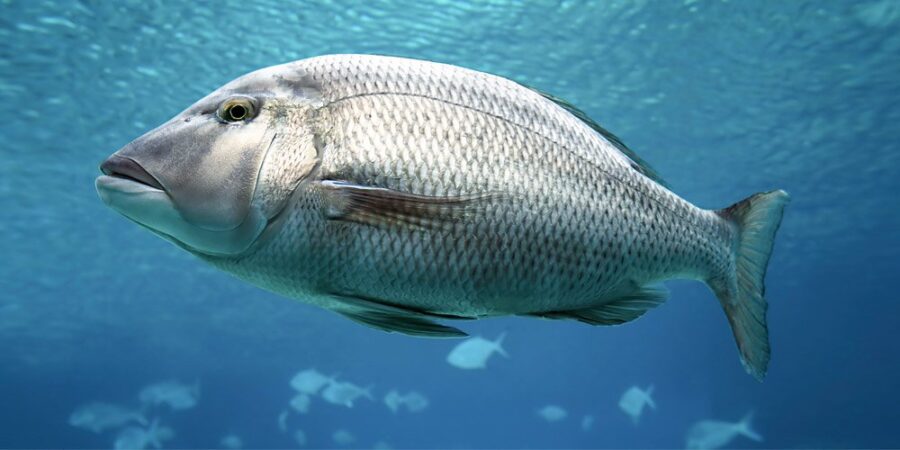Fish are amazing animals who experience the world in many ways that are similar to us. Their capacity to suffer and experience emotion has been long overlooked, but research is revealing more and more why these animals deserve our care and consideration. Discover for yourself…
1. Fish have pain receptors and the capacity to suffer
While we might not be able to read pain on a fish’s face, the evidence is increasingly clear that they experience a range of emotions including fear, joy, relaxation and playfulness. We know that fish have receptors to feel pain,[1] experience stress when they are confined[2] and, like us, try to avoid frightening events.[3] So when a fish is dragged out of water by a metal hook that has pierced his mouth it causes him significant pain and stress. So much so that research has found that if he survives, he’s likely to avoid being caught again.[4] Aquarium-bound fish have been seen playing (and possibly trying to reduce boredom) by riding the current of water pumps in their tanks, while other fish have been observed toying with objects seemingly for fun.[5]
This image contains content which some may find confronting

2. Each fish is an individual with their own personality
When we think of fish, we often see them as a collective without much variation between individuals. Recent research, however, is showing that fish do, in fact, have their own unique personalities — some are bolder and more eager to explore while others are more timid and tend to take less risks than their peers. Just like us, personality traits between fish vary depending on the genes they inherit from their parents and their own life experience.[6]
This image contains content which some may find confronting

3. Fish enjoy close friendships just like we do
Public life and reputation can be just as important to a fish as they are to us. Fish recognise and remember other individuals and build complex social networks. They know when they’re being watched by others and often alter their behaviour accordingly. ‘Bystanders’ can learn about the social status of an individual just by watching interactions between other fish.[7] They nurture friendships with affection[8] and have a host of amazing ways to communicate. While we’re used to hearing the serenades of birds, some fish call to each other with sounds of chirping or foghorns.
This image contains content which some may find confronting

4. Salmon remember the smell of their birthplace
The memory span of goldfish has long been underestimated but it’s finally been revealed that their long-term memory can last for many months at least. Perhaps the most impressive example of a fish’s memory is how, after several years, a salmon can follow her nose home. Amazingly, she remembers the specific smell of the stream in which she was born. Salmon will often battle strong currents, predators and even leap up waterfalls on this exhausting journey upstream.[9]
This image contains content which some may find confronting

5. Fish are excellent learners
Fish can learn how to use tools, build nests and, in some cases, outperform primates with their learning abilities.[10] Some fish have figured out impressive ways of obtaining food, like squirting jets of water from their mouth to capture insects above the surface[11] and using rocks to open shells.[12] They create burrows and chambers under the seabed for shelter, lining these structures with coral for added strength. Some fish build nests to hide their eggs from predators. Others bury themselves under sand and coral for protection to sleep or will even steal someone else’s bed if they like the look of it![13]
Fish are complex individuals, but sadly they are some of the most abused animals on the planet. Each year, demand for fish and fish products means that trillions of these intelligent, sensitive individuals are dragged out of oceans or raised in factory farm conditions. But, despite our differences, what we share with these animals is the desire to experience joy and to be free from suffering.
Be a friend to fish today!
Thankfully we can help protect fish from cruelty in our everyday lives by choosing to cut back on ‘seafood’ or leave fish off our plate completely. Discover healthy, fish-friendly cooking tips and recipes in our FREE Vegetarian Starter Kit.
References
[1] Sneddon, L. U., Braithwaite, V. A., & Gentle, M. J. (2003). Do fishes have nociceptors? Evidence for the Evolution of a Vertebrate Sensory System. Proceedings of the Royal Society of London B: Biological Sciences, 270(1520), 1115-1121.
[2] Pottinger, T., Prunet, P., & Pickering, A. (1992). The effects of confinement stress on circulating prolactin levels in rainbow trout (Oncorhynchus mykiss) in fresh water. General and Comparative Endocrinology 88(3), 454-60.
[3] Yue, S., Moccia, R., & Duncan, I. (2004). Investigating fear in domestic rainbow trout Oncorhynchus mykiss, using an avoidance learning task. Applied Animal Behaviour Science, 87, 343-354
[4] Raat, A. J. (1985). Analysis of angling vulnerability of common carp, Cyprinus carp/0 L., in catch-and-release angling in ponds. Aquaculture Research, 16, 171-187.
[5] Burghardt, G. M., Dinets, V., & Murphy, J. B. (2014). Highly Repetitive Object Play in a Cichlid Fish (Tropheus duboisi). Ethology, 120, 1-7.
[6] Millot, S., Péan, S., Labbé, L., Kerneis, T., Quillet, E., Dupont-Nivet, M., & Bégout, M.-L. (2014). Assessment of Genetic Variability of Fish Personality Traits using. Behavior Genetics, 44(4), 383-393.
[7] Grosenick, L., Clement, T. S., & Fernald, R. D. (2006). Fish can infer social rank by observation alone. Nature, 445, 429-432.
[8] Balcombe, J. (2016). In praise of fishes. Animal Sentience 2016.095.
[9] Dittman, A., & Quinn, T. (1996). Homing in Pacific salmon: mechanisms and ecological basis. Journal of Experimental Biology, 199, 83-91.
[10] Salwiczek, L. H., Pretot, L., Demarta, L., Proctor, D., Essler, J. et al. (2012). Adult Cleaner Wrasse Outperform Capuchin Monkeys, Chimpanzees and Orang-utans in a Complex Foraging Task Derived from Cleaner — Client Reef Fish Cooperation. PLoS ONE, 7(11), e49068.
[11] Wohl, S., Griebsch, M., Klostermeier, & Ina. (2006). Animal Cognition: How Archer Fish Learn to Down Rapidly Moving Targets. Current Biology, 16, 378-383.
[12] Brown, C. (2012). Tool Use in Fishes. Fish and Fisheries, 13(1), 105-115.
[13] Reebs, S. G. (2009-2013). Can fishes build things? Retrieved Nov. 10, 2016, from How Fish Behave: http://www.howfishbehave.ca/pdf/can%20fish%20build%20things.pdf







